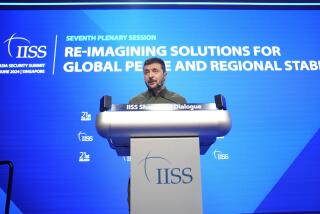China to Be Hot Topic at Conference
- Share via
SINGAPORE — Secretary of State Madeleine Albright will meet today with her Chinese counterpart in hopes of thawing relations that for the most part have been frozen since a U.S. warplane bombed China’s embassy in Yugoslavia 11 weeks ago.
Albright arrived here Saturday night for a Pacific Rim security conference that will highlight North Korea’s threatened test of a new long-range ballistic missile, tensions over competing territorial claims near vital sea lanes in the South China Sea, the region’s uneven recovery from the Asian financial crisis and political instability in Indonesia.
But Albright’s focus, and that of many of the 19 other foreign ministers and delegations attending the 32nd annual conference of the Assn. of Southeast Asian Nations (ASEAN), will be concern about China.
A senior administration official on Albright’s plane sought to lower expectations from her talks with Chinese Foreign Minister Tang Jiaxuan, the highest-level meeting between the two governments since the embassy was bombed during the North Atlantic Treaty Organization air campaign against Yugoslavia.
“What we don’t have is the robust, constant, high-level engagement on the whole range of issues that characterized the relationship” in the past, the official said, referring to China’s cutoff of an array of contacts with the United States after the May 8 bombing.
The official, who requested anonymity, added that China apparently has not decided “to resume a normal relationship. And I would not anticipate that as being a product of this meeting.”
The official said Albright’s most pressing priority when she meets with Tang on the sidelines of the ASEAN forum will be to urge China to show restraint in its dispute over the status of Taiwan.
The island’s president, Lee Teng-hui, sparked a bitter war of words with Beijing when he announced July 9 that Taiwan’s future relations with China must be on a “state-to-state” basis. Beijing considers Taiwan a breakaway province rather than a separate nation on a par with China.
On Saturday, a Foreign Ministry spokesman in Beijing repeated a warning that China reserves the right to use military force if Taiwan declares independence.
Wary of the growing danger, foreign ministers attending the ASEAN conference appealed for calm. In a communique Saturday, they reaffirmed support for Beijing’s “one China” policy and warned that rising tensions “could seriously affect regional peace and stability and prospects for economic recovery.”
During her flight here, Albright appeared determined to avoid further roiling relations with Beijing. She said nothing publicly about the Communist regime’s abrupt outlawing Thursday of the spiritual movement known as Falun Gong, which claims 100 million followers worldwide. The movement’s followers in China have staged widespread, though peaceful, protests demanding official recognition by the government.
The administration official said the crackdown on the quasi-religious group, including the arrest of leading Falun Gong adherents, could come up during Albright’s meeting with Tang. “We don’t take a position on their beliefs or teachings, but we do believe they have a right to express those beliefs and to assemble peacefully.”
The United States has no extradition treaty with China and has no plans to repatriate the sect’s leader, Li Hongzhi, from his New York home to China, the U.S. official said. Some of Li’s followers have expressed concern that China might seek to extradite him, the official said.
Another administration official indicated, however, that Washington also is uneasy about the millenarian sect. The group “makes people nervous,” the official said.
China’s latest human rights crackdown further complicates a relationship with the U.S. that has suffered repeated strains since last year. Critics in Washington have condemned China’s arrests of pro-democracy activists, its buildup of tactical missiles on the coast facing Taiwan and its alleged theft of U.S. nuclear weapons secrets.
Chinese officials, in turn, have bitterly denounced U.S. plans to offer an advanced antimissile shield to Taiwan if the technology ever becomes feasible. They also were angered when President Clinton unexpectedly refused, during a Washington summit in April with Chinese Premier Zhu Rongji, to support a proposed deal that would have allowed China to join the World Trade Organization, which sets global trading rules.
Albright already met with Indian Foreign Minister Jaswant Singh, in the first such meeting since Washington appeared to back India in its recent successful offensive to oust Pakistani-backed guerrillas who crossed into the Indian-held portion of the disputed Kashmir region. On Monday, she will meet Russian Foreign Minister Igor S. Ivanov to discuss Russia’s role in the Kosovo conflict.
ASEAN is a regional security group whose members include Brunei, Cambodia, Indonesia, Laos, Malaysia, Myanmar, the Philippines, Thailand, Singapore and Vietnam.
The ASEAN conference is not expected to produce new initiatives since the group meets mostly for discussions. Aides said Albright will take the lead in sessions focusing on such regional concerns as organized crime and trafficking in women and children. But an administration official stressed that Albright’s presence at the ASEAN forum is significant in itself.
“Just the fact that the secretary is going is supposed to demonstrate that Kosovo is over, she’s back in Asia,” the official said. “We’re back, engaged in Asia.”
Albright will leave Wednesday for a one-day postwar visit to Kosovo, a province of Yugoslavia’s main republic, Serbia.
More to Read
Sign up for Essential California
The most important California stories and recommendations in your inbox every morning.
You may occasionally receive promotional content from the Los Angeles Times.














